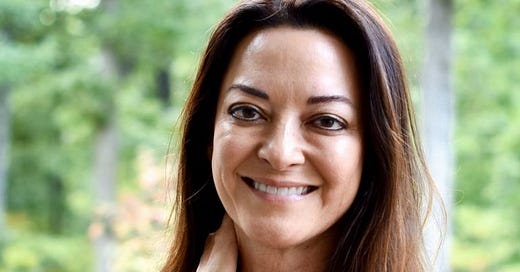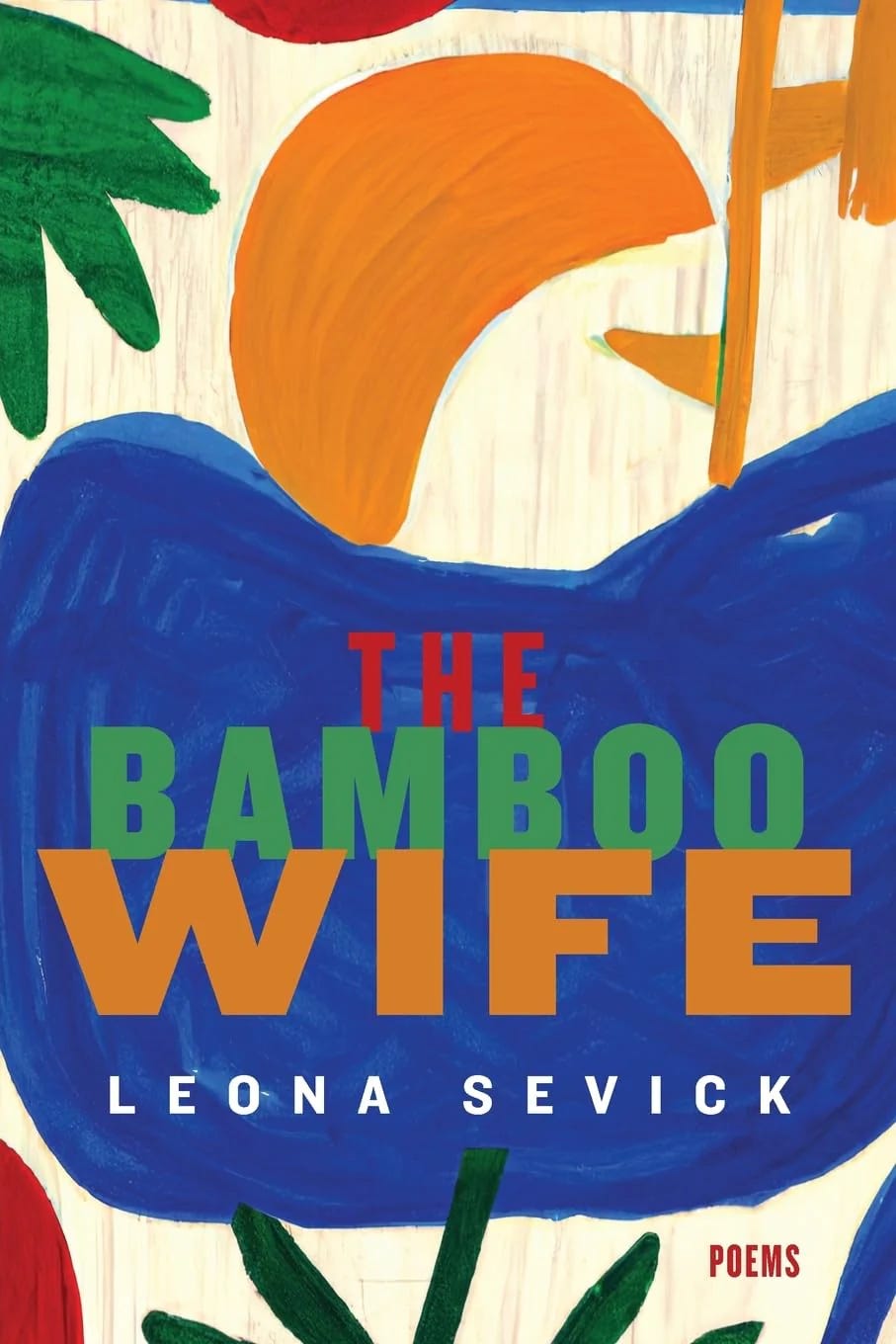Leona Sevick’s poetry career began with “a poem on a napkin in a bar.” A scholar of American literature with no formal education in creative writing, Sevick is now the author of two full length poetry collections. I recently had the pleasure of speaking with her about her most recent release, The Bamboo Wife.
Let’s start with a short introduction. Could you tell us a bit about your personal/artistic background?
I grew up in a small rural town in Maryland, just south of the Mason-Dixon line. My mother was a South Korean immigrant, and she worked in a sewing factory in town. My father became a state trooper. We spoke English and Korean in my house; my grandmother, who only spoke Korean, lived with us when I was a child.
In a rural environment like the one I grew up in, there was little to do but read. I read voraciously, exhausting most of the books in our little public library. I excelled at many academic subjects, but what I loved best to do was to read, and to my parents’ credit (they never graduated from college), they gave me the freedom to choose what I wanted to study. I chose to study literature.
I earned a doctorate in literature and language at the University of Maryland, and I got my first academic job when my son was a toddler and I was pregnant with my daughter, now 22 and 19, respectively. I never once took a creative writing class, though I’d had many opportunities.
One day, in 2011, exhausted by motherhood and a demanding academic job, I wrote a poem on a napkin in a bar. At the urging of my colleague Tom Bligh, a fiction writer and the director of my institution’s creative writing program, I entered it into the Split This Rock poetry contest, and Naomi Shihab Nye chose it as the winner. I was hooked.
How did The Bamboo Wife find its home at Trio House Press?
Like many poets, I keep an eye out for book contests that attract writers I admire. I noticed that Trio House Press regularly offered full-length book contests, and the finalists in these contests were very fine poets. I also admired the look of the books THP had already published. I entered my book in a contest in 2023 and was named a finalist, and then my book was selected for publication by Natasha Kane, who also edited the book.
In addition to being a poet, you are also a scholar of American Literature. How has your work as an academic impacted your art, if at all?
The commitment and stamina required to be an American literature scholar trained me to write concisely and clearly and to read closely. Still, the greatest impact on my creative work came from the necessity of reading broadly. My love for the work of James, Eliot, Pound, Stein, Cather, Wharton, Fitzgerald, Morrison, Rich, Clifton, Roth, and many other modern and
contemporary writers, developed during this time of intense study and argumentation. I can never put a word on a page without thinking about these writers. Studying their work and their processes helps me to hold my own work to a higher standard.
How does the process of publishing academic work compare to publishing poetry?
I spent years doing research for my dissertation and for my published academic writing. As an academic writer, I was compelled to read everything that has been written about my chosen text or subject. This is not the case in creative work. The poet’s vision does not necessarily require testimony from others; keen senses and an open heart can provide all the testimony that’s needed in a poem. I love poetry’s simplicity of process. In grad school, I used to envy the slim little satchels carried by the MFA students while I was lugging around backpacks full of secondary sources. Now I carry a slim little satchel.
Of course, I familiarize myself with the journals that could—potentially—publish my work, and this is where academic publishing is not so different from publishing poems. Understanding a journal’s readership and aesthetic is essential to both kinds of publishing. There are plenty of journals I admire that will never publish my work because of the difference in aesthetic, and that’s well and good.
Something that immediately impressed me about The Bamboo Wife was its thematic unity. What was the process of curating this collection like for you? Were there any poems that were ultimately cut from the final book for the sake of cohesion?
I’ll admit that organizing a book of poems is not my greatest strength. I think I’m too close to the work, and organizing a book requires some objectivity. I had several folks work with me on pulling together what became The Bamboo Wife. My close friend Snowden Wright, a fiction writer, helped me line edit poems. The poet Lauren Alleyne, also my good friend, read an early draft of the book and helped me cull and organize it. Jan Freeman rearranged the sections into the structure you see now. Finally, Natasha Kane was enormously helpful with the fine edits. It takes a village, it seems, to pull my work into a coherent narrative! I did cut a handful of poems, some of which I still like. They may belong in another book; we’ll see.
While I was researching for this interview, I found a question that you had asked another poet in an interview for “Speaking of Marvels’”, and I was curious to hear your answer: do you ever find yourself hiding in plain sight in your work?
Of course. There are many things about my life that are intensely personal, and it’s difficult to put that information out into the world without feeling too vulnerable. My poems are also peopled by friends and family who have not necessarily signed on to displaying their lives on my
pages. The poet Nickole Brown once told me that my poems are always hiding something, and not always well! I’ve thought about this characterization a lot, and I think it’s apt.
This collection grapples with the tension between the rigid social expectations placed upon women, particularly as wives and mothers, and the messiness of everyday life. What interests you about these tensions?
Most of the women I know suffer with impossible societal demands in some way. I’ve known extremely successful women who can only speak about how they’ve fallen short as mothers,as wives, or as professionals. I’ve had the good fortune to work with people who—if they’ve had unfair expectations of women generally or of me in particular—did not voice them. I’ve also known men who clearly expect women to be all things at once: nurturing and tough, gentle and assertive, modest and sexy, humble and proud. It’s exhausting, and pointless, and yet these gendered views persist. I’m grateful to have been raised by a father, who, though difficult in many ways, did something right: he convinced me I could be anything I wanted to be. I know not all women are this fortunate.
The Bamboo Wife is an incredibly raw, honest collection. Do you ever struggle with displaying that sort of vulnerability on the page?
Vulnerability is something that I have difficulty showing in my everyday life, and so maybe this is why I have shown it on the page since I first started writing. It’s very natural for me to be vulnerable in my poems, though I know it surprises some readers, including my children.
Now that you have published a couple of collections, what are some things that you wish you had known towards the beginning of your publication journey?
One of the things I do well is to surround myself with people who give me sound advice, and this has been true throughout my publishing and life journey. Because I did not train as a poet, there is much I’m still learning about craft and about publishing. I had to create my own network of writer colleagues, which I did by attending conferences like Longleaf, Sewanee, and Bread Loaf and accepting residencies like the ones at the Hambidge Center and the Virginia Center for Creative Arts. I’m not afraid to ask for help and direction, and friends and colleagues have been enormously generous with their time and advice. I have two fussy fiction writer friends whose words are always banging around in my head, and they keep me from stumbling into mediocrity.
What are you looking forward to in the coming months?
I’m looking forward to promoting The Bamboo Wife at independent bookstores and book festivals. I’ve learned a lot from the folks at Trio House Press about how to promote this book in a way that feels authentic to me. I can be shy about promoting myself and my work, which was an impediment to my effectively promoting my first book. Mapping a steady path that honors my work and the work of my fine publisher is a gift that I don’t plan to squander.
Annie Wyner is the Managing Editor for Carrion Magazine, and a submission reader for Trio House Press. They are a student at Oberlin College, majoring in Comparative Literature and Classics.
To view upcoming readings on Leona Sevick’s book tour, click here. Still need a copy of The Bamboo Wife?






